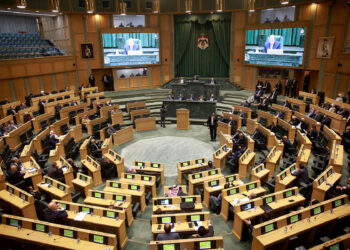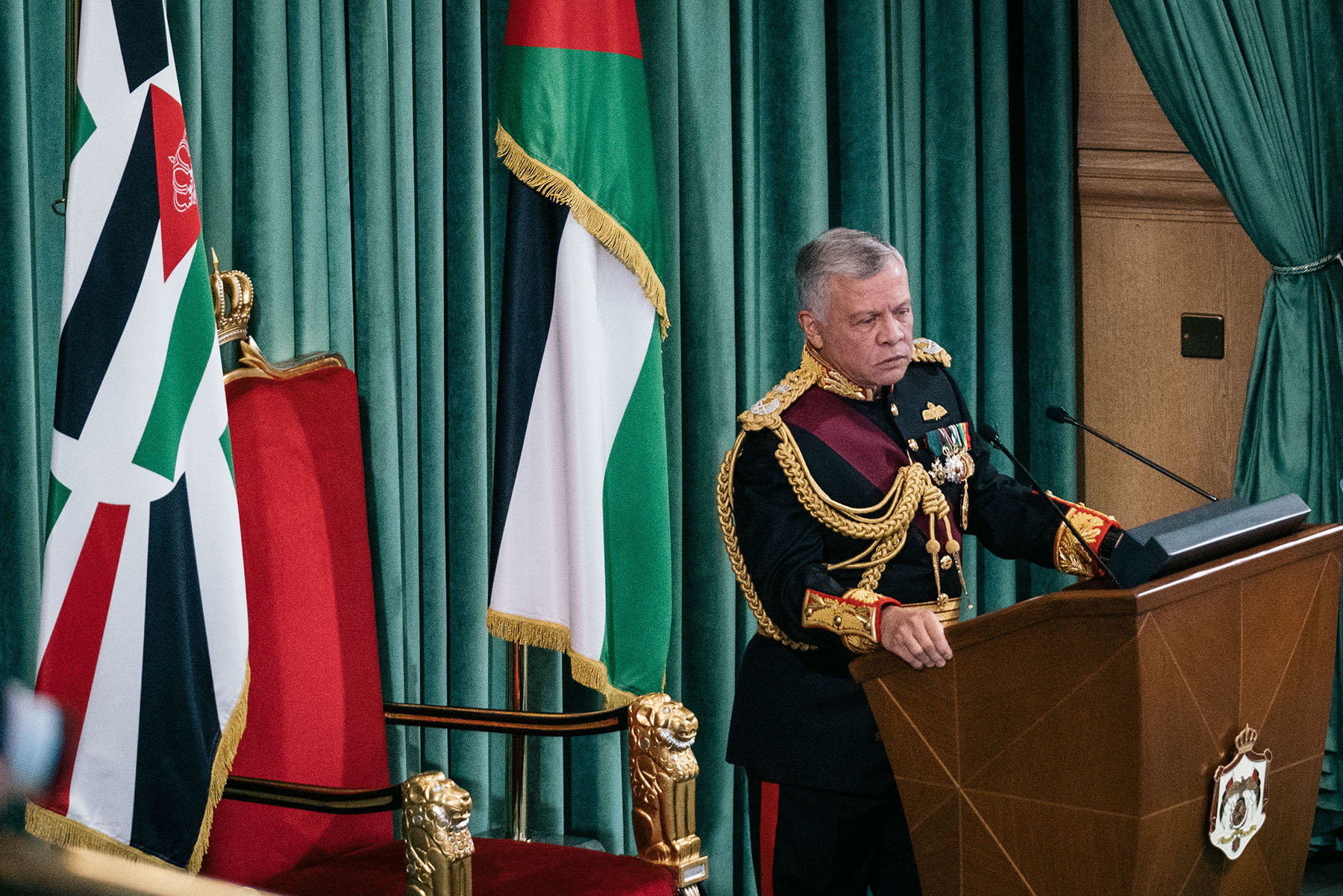Dario Sabaghi is a freelance journalist whose work has appeared in The Independent, Middle East Eye, Deutsche Welle and other outlets.
Tunisian filmmaker Karim Belhadj was about to finish his first full-length documentary on the Jewish community in Tunisia, after working as an assistant director on two short films and making his way up in the country's film industry for years. But his life was turned upside down when Tunisian police arrested him in his apartment in Tunis in March 2017. Police officers found him in the company of a 23-years-old male student, who later confessed to being a sex worker.
Both of them admitted to having had consensual sex, which is criminalized in Tunisia between members of the same sex and punishable with up to three years in prison. Belhadj, who was 38 years old at the time, was charged with homosexual activity and detained in the civil prison of Mornaguia, southwest of the Tunisian capital.
Belhadj's story is all-too familiar in Tunisia, where the criminalization of homosexuality contradicts the right to privacy and nondiscrimination that is supposedly enshrined in Tunisia's 2014 constitution. Under Article 24 of the constitution, the state is obligated to protect "the right to privacy and the inviolability of the home," while according Article 21, "All citizens, male and female, have equal rights and duties, and are equal before the law without any discrimination."
Yet homosexuality is criminalized under Article 230 of the Tunisian penal code, which dates back to the French colonial era. The law was established in 1913—more than a century before Tunisia's adopted its new constitution following the ouster of autocrat Zine El Abidine Ben Ali in the popular uprising that sparked the Arab Spring.
"As well as Article 230 [of the penal code], Articles 226 and 227, which condemn indecent public exposure and indecent assault, represent a threat to the LGBTQ+ community," said Mounir Baatour, a Tunisian lawyer and activist who co-founded and is the president of Shams, an NGO advocating for LGBTQ rights. "There are around 120 cases related to these articles each year." Baatour knows Belhadj's story well, and was himself similarly convicted in 2013 for having consensual sex with a man and spent four months in jail.
Belhadj's case stands out because, soon after his arrest, it went public and, unlike others, was widely reported on by Tunisian and French media outlets. The media coverage of his arrest magnified its impact for him and his family, as he was married at the time, although separated from his wife, and had a young daughter. His ordeal shows what it is like living as an LGBTQ person in a country where homosexuality is condemned and illegal, and the social stigma of being exposed can have dire consequences on people's lives.
In a recent interview with Democracy in Exile, Belhadj said that his case was overwhelmingly publicized without his knowledge while he was in prison. "My identity was disclosed. It harmed my whole family," he said. "The parents of my daughter's classmates prevented their children from seeing her. My private life was exposed. My dignity has been dragged through the mud forever."
Belhadj's story is all-too familiar in Tunisia, where the criminalization of homosexuality contradicts the right to privacy and nondiscrimination that is supposedly enshrined in the constitution.
- Dario Sabaghi
Belhadj was detained for 13 months before he faced trial. He recounted that time in prison as a nightmare. "I was considered the worst kind of prisoner and treated like a plague by others," he recalled. "I ate alone. No one wanted to speak with me. In my cell, there were around 115 prisoners." He said he was robbed at least three times. "Everybody mocked and insulted me, both prisoners and prison officers, especially since my family, who had been shocked by the arrest, did not come to visit me during the first months of my imprisonment," he added. "However, my only concern was that I couldn't attend my daughter's birthday, which took place a few days after the arrest."
Belhadj's experience in prison is just one example of the violations and abuses that LGBTQ people face in Tunisian society. Ali Bousselmi, the executive director of Mawjoudin—"We Exist," in Arabic—a Tunisian NGO fighting for LGBTQ rights, confirmed Belhadj's account of prison and described the majority of Tunisian society as homophobic. "There are many violations in the streets and even inside the families of LGBTQ+ people," Bousselmi said. "LGBTQ+ people in Tunisia are often forced to work as prostitutes as they have no other choice for integrating themselves into society. Many suffer from lack of employment, and transgender people face problems with the public health care system."
Nora Noralla, a human rights researcher with the LGBT Rights division at Human Rights Watch, considers Tunisian society more accepting of its LGBTQ community than other countries in the Middle East and North. "It's a more liberal country than its neighbors, but the social view of LGBTQ+ rights might not be so liberal as we could think," she said. "After the revolution in 2011, things have changed, but homophobia persists."
When Mounir Baatour, who is also the head of Tunisia's Liberal Party, announced in 2019 that he would run for the country's presidency, he became the first openly gay presidential candidate not only in Tunisia but throughout the Arab world. His campaign focused on civil and individual rights, including the repeal of Article 230. But a month after his presidential campaign ended, Baatour fled to France to escape what he called "very serious" death threats from Islamists in Tunisia stemming from a post he published on Facebook perceived as offensive to Islam. He was prosecuted by Tunisian authorities for the post and later sentenced to one year in prison.
Just like Baatour was when he was arrested in 2013, Belhadj was subjected a "rectal examination" to "prove" the charges of sodomy against him. Belhadj said the "test" was forced on him even though he refused. "It was horrific," Belhadj recounted. "Since that day, I have had nightmares, and I am still traumatized. This happened in front of several people. A doctor did the test with coldness, indifference and disdain. He was accompanied by his assistant, who was not asked to leave, and two police officers accompanied me. I was unhandcuffed at the very last minute. Then, the doctor ordered me to put myself in a very degrading posture as quickly as possible."
"I believed, and I still believe, that it was a form of rape," he said.
"It's a more liberal country than its neighbors, but the social view of LGBTQ+ rights might not be so liberal as we could think. After the revolution in 2011, things have changed, but homophobia persists."
- Nora Noralla
After Belhadj was released from his 13 months in prison in 2018, he found himself psychologically devastated. All of his family members disowned him, except for his sister and wife. "My parents told me they no longer want to have any contact with me," he said. Belhadj tried to rebuild his life and work again in the film industry, but the only job he could find was as a private film school teacher. The stigma of being identified as gay led to more discrimination in public, including whenever he went out to bars and cafes, and frequent harassment by police.
Belhadj said that three bouncers at a music venue in Tunis beat him with baseball bats a night after he attended a concert there, because they recognized him as the gay filmmaker who appeared on the news. "Besides the bruises all over my body, I had a double fracture in my arm and underwent surgery," he said. "They were so determined to beat me as if I was the devil in person and the most execrable person who deserved such a fate." He said that the manager of the venue that had hosted the concert "begged me to file a complaint, but it was out of the question to set foot at a police station again."
He left Tunis to live for a few months on the island of Djerba, off the Tunisian coast, to recover from the beating, but he had little money and was suffering from depression, with thoughts of suicide. When he went back to Tunis, he found that his father had changed the lock on the house where Belhadj had lived.
Belhadj's circumstances reflect the "legal and social abuse" of LGBT people in Tunisia and the wider Arab world, according to Noralla of Human Rights Watch. "LGBTQ+ people in the MENA region can be beaten by their family or close social members. Victims rarely try to reach out to authorities afterward," she explained. "There are many claims and allegations against police actors reporting that they actively abuse LGBTQ+ people because of their gender and sexual orientation. They verbally and physically torture them inside and outside police stations and in prison."
In a country and society with this level of discrimination, NGOs play a vital role and have become a lifeline for survival for LGBTQ people. Following the Tunisian revolution, thousands of NGOs popped up in the country, including many that provide services to the LGBTQ community, such as legal aid, financial assistance, and psychological and health support. Asked why the Tunisian government allows these NGOs to operate while the penal code criminalizes homosexuality, Baatour said that there is a difference between civil and criminal law: "The civil law allows to create an association, but the criminal law condemns homosexuality."
With the help of a NGO in Tunis, Belhadj was able to start psychological therapy. Thanks to the intervention of the Ministry of Culture and its fund for artists, he could afford to undergo surgery, and he is gradually regaining the use of his left hand fractured during the assault outside the concert venue. The ministry's support was another sign of the grim paradox in Tunisia, where NGOs like Mawjoudin can organize public events to advocate for and celebrate LGBTQ people, including film festivals, but where same-sex sexual activities are illegal and lead to prison.
Belhadj is now planning to leave Tunisia and seek asylum abroad. "I see no perspective, no glimmer of hope in this long dark tunnel I have been going through since my incarceration," he said. "I aspire to live serenely, in peace, in anonymity, and feeling safe one day."
































![Security forces loyal to the interim Syrian government stand guard at a checkpoint previously held by supporters of deposed president Bashar al-Assad, in the town of Hmeimim, in the coastal province of Latakia, on March 11, 2025. Syria's new authorities announced on March 10, the end of an operation against loyalists of deposed president Bashar al-Assad, after a war monitor reported more than 1,000 civilians killed in the worst violence since his overthrow. The Syrian Observatory for Human Rights said the overwhelming majority of the 1,068 civilians killed since March 6, were members of the Alawite minority who were executed by the security forces or allied groups. (Photo by OMAR HAJ KADOUR / AFP) / “The erroneous mention[s] appearing in the metadata of this photo by OMAR HAJ KADOUR has been modified in AFP systems in the following manner: [Hmeimim] instead of [Ayn Shiqaq]. Please immediately remove the erroneous mention[s] from all your online services and delete it (them) from your servers. If you have been authorized by AFP to distribute it (them) to third parties, please ensure that the same actions are carried out by them. Failure to promptly comply with these instructions will entail liability on your part for any continued or post notification usage. Therefore we thank you very much for all your attention and prompt action. We are sorry for the inconvenience this notification may cause and remain at your disposal for any further information you may require.”](https://dawnmena.org/wp-content/uploads/2025/04/syria-22039885951-360x180.jpg)






